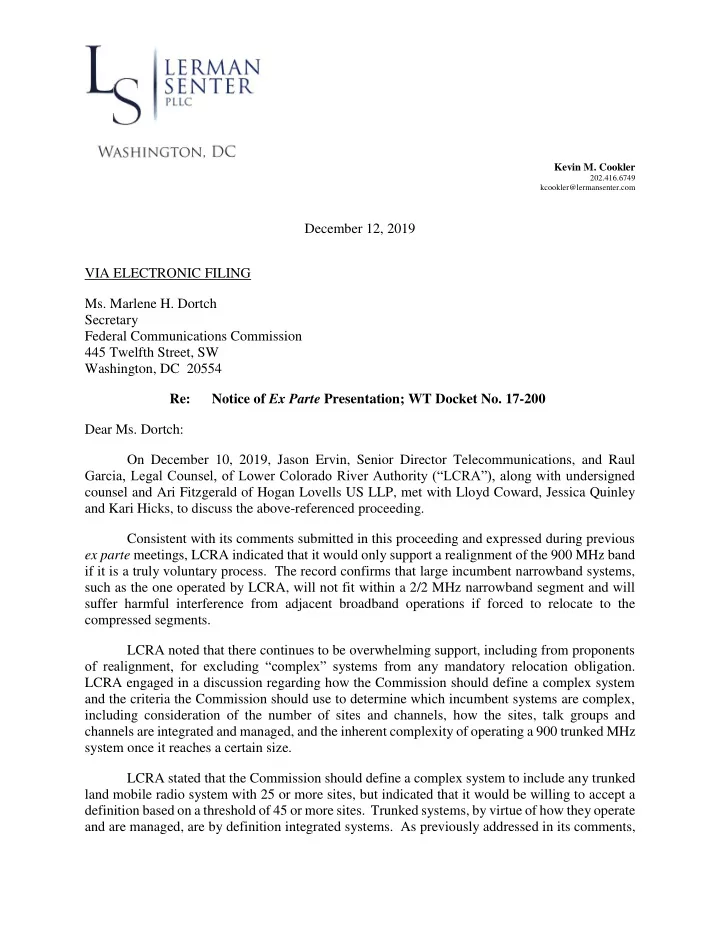

Kevin M. Cookler 202.416.6749 kcookler@lermansenter.com December 12, 2019 VIA ELECTRONIC FILING Ms. Marlene H. Dortch Secretary Federal Communications Commission 445 Twelfth Street, SW Washington, DC 20554 Re: Notice of Ex Parte Presentation; WT Docket No. 17-200 Dear Ms. Dortch: On December 10, 2019, Jason Ervin, Senior Director Telecommunications, and Raul Garcia, Legal Counsel, of Lower Colorado River Authority (“LCRA”), along with undersigned counsel and Ari Fitzgerald of Hogan Lovells US LLP, met with Lloyd Coward, Jessica Quinley and Kari Hicks, to discuss the above-referenced proceeding. Consistent with its comments submitted in this proceeding and expressed during previous ex parte meetings, LCRA indicated that it would only support a realignment of the 900 MHz band if it is a truly voluntary process. The record confirms that large incumbent narrowband systems, such as the one operated by LCRA, will not fit within a 2/2 MHz narrowband segment and will suffer harmful interference from adjacent broadband operations if forced to relocate to the compressed segments. LCRA noted that there continues to be overwhelming support, including from proponents of realignment, for excluding “complex” systems from any mandatory relocation o bligation. LCRA engaged in a discussion regarding how the Commission should define a complex system and the criteria the Commission should use to determine which incumbent systems are complex, including consideration of the number of sites and channels, how the sites, talk groups and channels are integrated and managed, and the inherent complexity of operating a 900 trunked MHz system once it reaches a certain size. LCRA stated that the Commission should define a complex system to include any trunked land mobile radio system with 25 or more sites, but indicated that it would be willing to accept a definition based on a threshold of 45 or more sites. Trunked systems, by virtue of how they operate and are managed, are by definition integrated systems. As previously addressed in its comments,
Ms. Marlene H. Dortch December 12, 2019 Page 2 LCRA also discussed that the Commission should consider complex systems to include those that are shared with public safety entities pursuant to S ection 90.179 of the FCC’s rules and those that have qualified for an extended implementation period. LCRA proposed that the Commission adopt interference protection threshold levels similar to protection levels afforded to 800 MHz systems and pointed out that there is a developing consensus in the record in support of doing so. 1 LCRA urged the Commission to ensure that incumbent 900 MHz narrowband incumbents are fully reimbursed for any and all costs they incur as part of any relocation plan, including future operating and maintenance costs incurred post- relocation. LCRA recommended that the Commission clarify that a prospective 900 MHz broadband licensee will have the flexibility to provide any kind of communications service consistent with the regulatory status chosen by the licensee, including private internal communications services. LCRA also recommended that any performance requirements adopted by the Commission be flexible enough to account for a broadband licensee that deploys a private LTE network or provides services on a non-common carrier basis. LCRA supported the comments by the Utilities Technology Council and other utilities that the FCC should adopt performance requirements based on geographic coverage and substantial service instead of solely relying on population benchmarks. Finally, LCRA asserted that if an incumbent complex narrowband system licensee becomes the broadband licensee, it should be allowed to deploy a broadband network while continuing to maintain its narrowband operations. Furthermore, the incumbent complex system licensee should be given the flexibility to determine the most appropriate size of the broadband allocation within its license area and to manage other technical and operating issues such as whether to operate with a guard band. In accordance with the Commission’s rules, one copy of this ex parte notice is being filed electronically for inclusion in the record of this proceeding. 1 See Letter from Elizabeth R. Sachs, Counsel for Anterix, Inc. to Marlene H. Dortch, Secretary, FCC, WT Docket No. 17-200 , Attachment “Summary of Technical Issues” at 3 -4 (filed Oct. 4, 2019) (acknowledging that some incumbents support adopting these interference thresholds and stating that Anterix does not oppose adoption of such thresholds to accommodate the desires of those incumbents and to align the thresholds for 800 and 900 MHz narrowband services).
Ms. Marlene H. Dortch December 12, 2019 Page 3 Respectfully submitted, Lower Colorado River Authority /s/ Kevin M. Cookler Kevin M. Cookler Lerman Senter PLLC Counsel to Lower Colorado River Authority cc: Lloyd Coward Jessica Quinley Kari Hicks
Recommend
More recommend